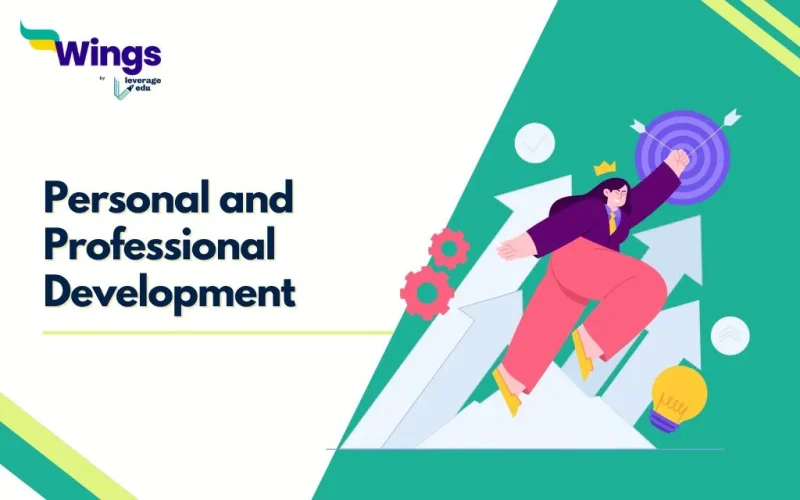Personal and professional development has become more important in today’s rapidly evolving workplace. According to Payscale, the recent global shifts in how we work have highlighted the importance of continuous learning and adaptation. Almost 78% of people reported that they expanded their skills or knowledge during recent years. Read this article to learn more about the fundamental aspects of personal and professional development and how they intersect to create successful career trajectories.
This Blog Includes:
Understanding Personal Development
Personal development is an innate human need deeply rooted in our desire to grow and reach our full potential. It’s a lifelong journey that begins in childhood and continues throughout our lives. At its core, personal development includes:
- Setting meaningful career goals
- Acquiring new skills
- Developing individual qualities
- Working toward self-actualisation
Drawing from Maslow’s hierarchy of needs, personal development can only truly flourish when fundamental needs such as safety, security, love, belonging, and esteem are satisfied. When these basic requirements are met, individuals become more motivated and engaged, creating genuine growth and development capacity.
Understanding Professional Development
While personal development spans our entire lifetime, professional development focuses on career-oriented growth. It represents a targeted approach to acquiring new knowledge and skills that support career advancement and workplace effectiveness. Professional development serves several crucial purposes:
- Enhancing current job performance
- Preparing for future career opportunities
- Building expertise in specific areas
- Contributing to organisational success
Must Read: What is Group Discussion in Communication?
Why is Personal and Professional Development Important?
Personal and professional development are both ways to improve skills and knowledge. Let’s read about its importance for individuals and organisations.
- Enhanced Skills and Confidence: Personal development builds confidence and equips individuals with skills that positively impact their professional lives.
- Fulfilment and Happiness: Meeting personal development goals leads to a sense of accomplishment and fulfilment.
- Adaptability: In a rapidly changing world, continuous learning helps individuals stay relevant and resilient.
- Improved Performance: Employees with access to professional development opportunities are more productive and motivated.
- Retention of Talent: Companies that invest in employee growth experience lower turnover rates. A 2016 Gallup survey found that 70% of employees consider professional development a significant factor in job satisfaction.
- Profitability: Organizations that prioritise employee development report 24% higher profit margins compared to those that don’t.
How Personal and Professional Growth are Linked?
Personal and professional development are inherently interconnected, functioning as two sides of the same coin. When personal needs are unmet, it can significantly impact mental health and well-being, which in turn affects professional growth. This connection manifests in several ways:
- Mental Wellbeing: A strong foundation of personal development supports professional resilience.
- Skill Transfer: Personal skills often enhance professional capabilities.
- Motivation: Personal growth often drives professional ambition.
- Career Advancement: A commitment to personal development often indicates professional potential to achieve something great.
Must Read: Workplace Ethics: Meaning, Examples, Significance
Examples of Personal and Professional Development in Career
Here are examples of personal professional development plans tailored to different career scenarios:
Example 1: Early-Career Software Developer
As a new software developer, these actions will strengthen your technical foundation, teamwork abilities, and confidence:
- Focus on improving technical skills and networking.
- Start by enrolling in an advanced programming course, such as Python or JavaScript, to enhance your coding expertise.
- Contribute to open-source projects on GitHub, aiming for at least three contributions within six months to improve your collaboration and Git skills.
- Attend local tech meetups, join online forums, and participate in two tech conferences yearly to build connections and learn from experienced professionals.
Example 2: Mid-Career Marketing Manager
As a mid-career marketing manager follow these steps to enhance professional effectiveness while supporting a fulfilling personal life:
- Enrol in leadership and communication workshops to refine management techniques and active listening.
- Create boundaries by scheduling “unplugged” times and prioritising self-care.
- Encourage open communication through bi-monthly team meetings where feedback and ideas are shared.
- Network at industry conferences and join peer support groups for fresh perspectives.
- Dedicate time to hobbies and family to maintain balance.
Practical Steps for Personal and Professional Development
For individuals, personal and professional development requires intentional effort and consistency. Here are actionable steps:
1. Set Clear Goals: Define what you want to achieve in both personal and professional spheres. Break down larger goals into smaller, manageable ones.
2. Identify Skills Gaps: Assess your current capabilities and determine areas for improvement. It is also important to get feedback from peers or mentors during the entire process.
3. Use Available Resources: Take advantage of company-provided training programs. Explore online courses, webinars, and industry-relevant certifications.
4. Create a Learning Plan: Schedule dedicated time for learning and self-improvement. Mix formal learning (courses, certifications) with informal methods (podcasts, books).
5. Track Progress and Reflect: Maintain a journal to track your growth and achievements. Reflect on what worked well and what could be improved.
FAQs
5 P’s of professional development are purpose, personal brand, people, performance, and plan
To improve your personal growth and professional development, start by defining your results and motivation. Also, it is important to schedule dedicated time for learning.
Personal development is divided into 5 categories: mental, social, spiritual, physical, and emotional.
A professional development plan (PDP) involves five key elements:
1) Assessing current skills,
2) Setting SMART goals,
3) Identifying necessary resources,
4) Developing a strategy to achieve goals, and
5) Regularly evaluating progress.
Check out other blogs on Career Counselling here:
For more such informative content, visit our page career counselling, and Follow Leverage Edu


 One app for all your study abroad needs
One app for all your study abroad needs












 60,000+ students trusted us with their dreams. Take the first step today!
60,000+ students trusted us with their dreams. Take the first step today!